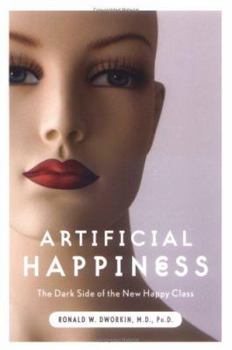Artificial Happiness: The Dark Side of the New Happy Class
Select Format
Select Condition 
Book Overview
Ronald Dworkin, Fellow at the Hudson Institute, has written a book of social commentary that combines the politics of healthcare and medical ethics with several momentous changes that have... This description may be from another edition of this product.
Format:Hardcover
Language:English
ISBN:0786717149
ISBN13:9780786717149
Release Date:April 2006
Publisher:Carroll & Graf Publishers
Length:343 Pages
Weight:1.20 lbs.
Dimensions:1.2" x 5.8" x 8.6"
Customer Reviews
5 ratings
Well written
Published by Thriftbooks.com User , 18 years ago
The book is a critique of the whole health industry in general with an emphasis on mental health. Dworkin warns against drugs and/or activities that might mask the cause of unhappiness and hamper treatment and rehabilitation. AH is not a book that criticizes antidepressants as many of the critics here claim, it simply criticizes the careless use of them by patients and physicians alike. The critics are voting on the message of the book instead of the quality and content of the book.
You will love it or you will hate it.
Published by Thriftbooks.com User , 18 years ago
I loved this book, "Artificial Happiness", because the author articulated in a well thought and researched fashion exactly what has not been discussed enough. Unhappiness is NOT a disease. Unhappiness, contrary to pharmaceutical advertisements and "doctors advice" is a natural and normal consequence of the "downs" in the "ups & downs" of life. It is the red light on the dashboards of our lives that prompts us to make constructive changes. Or it was. For well over 2000 years the greatest thinkers in Western Civilization have puzzled over and written about "happiness" and what constitutes "the good life". Their words and thoughts are there and free for the taking. Few people are interested. Enter...pharmaceutical marketing and the dis-ease merchants. Today tens of millions are sold, for huge profits, on the nonsensical idea that people's brains just don't work right any more. They have become "unbalanced" and get balanced again with drugs. [read: It's not your fault.] At last someone in the medical field has had the courage to write what has always been obvious to many. Life is what we make it...garbage in, garbage out.....bad decision making leads to bad outcomes. BRAVO!
right on
Published by Thriftbooks.com User , 18 years ago
Great book. I went to my primary care doctor recently, just for a check-up. I've also been having some trouble in my private life and I got a little sad when talking about it with him. First thing he said was that maybe he should write me a prescription for Zoloft. It was ridiculous. How was Zoloft going to fix my life? Take this and multiply it by thirty million people and you got Dr. Dworkin's book. I read the other reviews of his book on this site. I don't know why the bad ones defend their psychiatrists. Dr. Dworkin doesn't blame the psychiatrists. He blames the primary care doctors. Sounds like they didn't read the book.
haven't really thought about it before
Published by Thriftbooks.com User , 18 years ago
I've been a nurse for fifteen years. I've noticed the things the author talks about in health care, but I never thought they were connected in any way. The way he connects them is really original and interesting. And he's right. I know a lot of people taking Prozac for unhappiness and not really for clinical depression. The author is really careful about separating real depression from unhappiness. He thinks depression, not unhappiness, should be treated with drugs. The book was easy reading. And a fun read too. But I really learned a lot about doctors and neuroscience and alternative medicine. I even sort of changed my views on some things.
provocative and timely
Published by Thriftbooks.com User , 18 years ago
Dworkin's carefully focussed argument about doctors and how they approach medicine profession exposes some serious concerns about the profession. His concern is not about the treatment of real depression, but rather the more specious category in the literature of "minor depression" -- which can mean almost anything -- and doctors have used it to prescribe psychotropic drugs for almost anyone. (The overuse of Ritalin, while a somewhat different case, is another example of the same treat-'em-and-forget-em techniques. Until children start committing suicide.) Reading the whole book very frequently provides a much clearer picture of what an author is saying than reading five pages.





